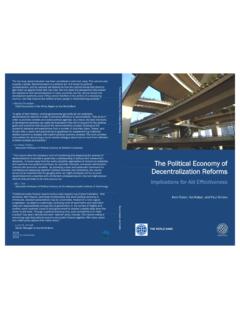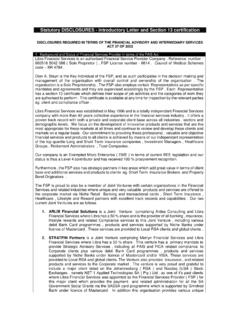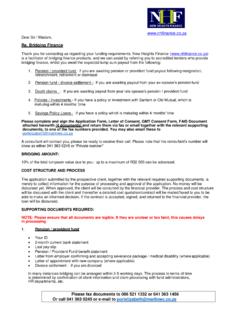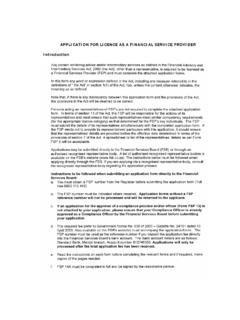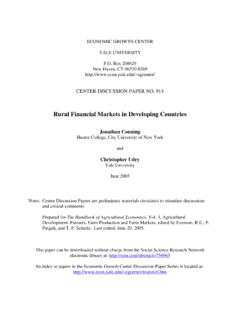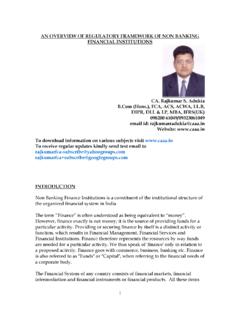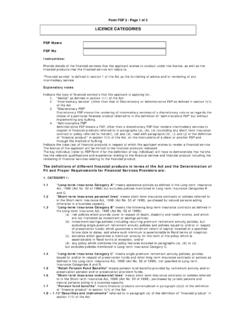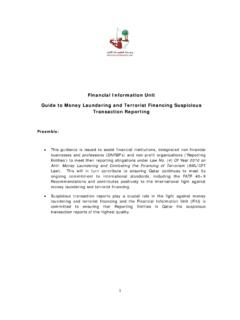Transcription of THE NATIONAL FINANCIAL INCLUSION STRATEGY …
1 THE NATIONAL FINANCIAL INCLUSION STRATEGY CENTRAL BANK OF NIGERIA Introduction Definitions of FINANCIAL INCLUSION FINANCIAL INCLUSION and NATIONAL Economic Development The NATIONAL FINANCIAL INCLUSION STRATEGY Key instruments for implementing the NATIONAL FINANCIAL INCLUSION STRATEGY FINANCIAL INCLUSION Stakeholders and their key Roles and Responsibilities Where we Are: CBN Where we Are: Other stakeholders (PENCOM, NAICOM, SEC) State Government Collaboration/Participation Challenges Conclusion Outline 1. Introduction Dearth of FINANCIAL services exclude people from contributing to growth and development. As at 2012, according to a survey by the Enhancing FINANCIAL Innovation and Access (EFInA), about or million adult Nigerians were excluded from FINANCIAL services. In order to reduce the number of the excluded population, the Central Bank of Nigeria (CBN) launched the NATIONAL FINANCIAL INCLUSION STRATEGY (NFIS), in October 2012. The STRATEGY focuses on interventions that will increase access to: payments, savings, credit, remittances, pension, insurance under affordable terms and conditions The overall aim is to empower people, promote savings, increase the level of investment by diverse economic groups, catalyze increased productivity, improve income, reduce poverty and also promote a sound, safe, vibrant and stable FINANCIAL system.
2 The STRATEGY recognizes various stakeholders and apportioned roles and responsibilities to them on the basis of their comparative advantage This presentation takes a look at the STRATEGY itself and delves into the specific stakeholder roles and responsibilities as well as challenges. 2. Definitions of FINANCIAL INCLUSION Provision of range of quality and available FINANCIAL services to the underserved and financially excluded World Bank Wikipedia Reaching out to poor and low-income people and providing them with affordable FINANCIAL services tailored to their needs. United Nations Development Programme State in which all people who can use FINANCIAL services have access to a complement of quality FINANCIAL services, provided at affordable prices, in a convenient manner, and with dignity for the clients Centre for FINANCIAL INCLUSION Delivery of FINANCIAL services at affordable price and terms to the generality of the populace especially the disadvantaged and low income segment of the society.
3 Nigeria FI STRATEGY Definition FINANCIAL INCLUSION : Adult Nigerians having easy access to a broad range of formal FINANCIAL services that meet their needs and are provided at affordable cost Service characteristics: Diversity Affordability Focus on the formal sector Appropriateness-meets the need. 3. FINANCIAL INCLUSION and NATIONAL Economic Development Increased production of goods and services. Support reduction of food related inflation. Promote low cost models for FINANCIAL services. Engender better credit assessment and portfolios Strengthen risk management of FINANCIAL institutions and support institutional viability, safety and soundness. Boost exports, increase foreign exchange earnings, stabilize exchange rate and support efficient management of foreign reserves. Boost confidence of the public and promote savings, investment and general economic growth . 4. The Nigerian NATIONAL FINANCIAL INCLUSION STRATEGY : STRATEGY Targets Services Types Level in 2010 2020 Target Payments 70% Savings 60% Credits 2% 40% Insurance 1% 40% Pension 5% 40% NATIONAL Target: Reduce adult FINANCIAL exclusion in Nigeria from % in 2010 to 20% in 2020.
4 Specific targets were as follows: The Nigerian NATIONAL FINANCIAL INCLUSION STRATEGY : STRATEGY Targets Ctnd Channels for outreach and provision of the services are to increase in terms of units per 100,000 as follows: TABULAR DATA ON TOTAL VOLUME AND VALUE OF E-PAYMENTS TRANSACTIONS JANUARY 2012 - JULY, 2014 CHANNEL 2012 2013 JAN- JULY 2014 VOLUME VALUE VOLUME VALUE VOLUME VALUE TOTAL VOLUME TOTAL VALUE MOBILE MONEY 2,297,688 31,509,334, 15,930,181 143,371,761, 15,105,675 162,256,546, 33,333,544 337,137,642, ATM 375,487,756 1,984,658,822, 295,292,940 2,828,938,997, 214,630,836 2,003,138,073, 885,411,532 6,816,735,893, POS 2,555,045 48,008,310, 9,402,255 161,016,329, 10,730,147 165,091,250, 22,687,447 374,115,889, WEB 2,276,464 31,567,364, 2,900.
5 473 47,316,331, 2,730,768 36,247,404, 7,907,705 115,131,099, NIP 4,452,098 3,891,026,304, 17,111,532 10,844,922,940, 20,236,905 10,788,590,271, 41,800,535 25,524,539,515, NEFT 28,741,726 13,660,032,665, 30,034,009 14,307,317,707, 17,073,334 8,630,231,602, 75,849,069 36,597,581,975, 5. Key instruments for Implementing the NATIONAL FINANCIAL INCLUSION STRATEGY Agent banking: The delivery of banking services outside traditional bank branches, through touch points such as existing retail stores and petrol stations or via technology such as 'Point of Sale' (POS) devices and mobile phones. Mobile banking/ mobile payments: Access to FINANCIAL services through mobile phones that are either directly linked to a bank account or use of mobile wallets as intermediary virtual money accounts.
6 Linkage models: Enhancement of FINANCIAL and business cooperation between conventional FINANCIAL institutions (deposit money banks and development finance institutions)/government and microfinance banks/institutions for wholesale funding and on-lending transactions. 5. Key instruments for Implementing the NATIONAL FINANCIAL INCLUSION STRATEGY Client empowerment: Increase of bankability of population through coordinated NATIONAL FINANCIAL literacy initiatives that are complemented by consumer protection. MSME Development Fund: This will provide wholesale funds for MFBs and MFIs to enable them lend to their customers Tiered KYC requirement: Documentations and requirements for opening accounts are based on the risk envisaged with those customers Cash-less policy: simply put, promotes less use of paper and coin money to settle transactions owing to the cost effectiveness, convenience, speed. 6. FINANCIAL INCLUSION Stakeholders and their Key Responsibilities BANKS INSURANCE FIRMS DEVELOPMENT PARTNERS & EXPERTS GOVERNMENT AND PUBLIC SECTOR INSTITUTIONS TECHNOLOGY/ TELECOMMUNICATIONS FIRMS OTHER FINANCIAL INSTITUTIONS REGULATORS CBN, NDIC, NAICOM, PENCOM, NIMC, NCC.
7 SEC Federal Government Invest in infrastructure, such as a fibre-optic network for the telecommunications sector and solar panels to generate cheap electricity for rural areas Undertake necessary reforms collateral reforms, consumer protection act Contribute to the MSME Development Fund Maintain adequate security for Bank branches and agents Institute data protection and new land reform acts Set aside budget for social and minimum guaranteed pensions Federal Government Ctnd NIPOST Act as a agent for deposit money banks, microfinance banks and/ or mobile services providers Act as distribution center for FINANCIAL literacy materials Ministry of Education Institutionalize FINANCIAL literacy programs within educational institutions through agencies such as NATIONAL Universities Commission and Universal Basic Education Commission NATIONAL Bureau of Statistics /Surveyor General s Office Conduct surveys and provide data for FINANCIAL INCLUSION Central Bank of Nigeria Develop Guidelines for: Agent banking Tiered Know Your Customer Requirements FINANCIAL Literacy Consumer Protection Mobile Payment System Regulation of banks MSMEs Development Fund Cash-less policies Educate stakeholders on regulatory provisions Promote pilots to demonstrate the business case for FINANCIAL INCLUSION .
8 Create incentives for extending FINANCIAL services to disadvantaged groups. Central Bank of Nigeria Ctnd Establish the MSME Development Fund. Implement FINANCIAL literacy programmes. Create awareness among stakeholders on their roles and responsibilities and Coordinate the implementation of the STRATEGY Review and revise roles and responsibilities of stakeholders Ensuring that appropriate arrangements are made for FINANCIAL INCLUSION data gathering and publishing of the same Maintain a database for FINANCIAL INCLUSION in Nigeria Track and monitor progress on FINANCIAL INCLUSION vis- -vis the targets set Address capacity building initiatives on FINANCIAL INCLUSION issues Nigeria Deposit Insurance Corporation (NDIC) Sensitization on the Corporations programmes to ensure client support for FINANCIAL INCLUSION in schools and colleges. Build capacity of NDIC employees to brace up to the challenges of implementing the FINANCIAL INCLUSION STRATEGY . Promote collaboration between DMBs and MFBs for enhanced intermediation of FINANCIAL services.
9 Conceptualizing guidelines and framework that support the adoption of agent and mobile banking systems. Apex Association of FINANCIAL Institutions Provide wholesale funding for lending to low income clients Implement targeted FINANCIAL INCLUSION programs credit guarantees, refinancing Provide capacity building to MSMEs to improve their FINANCIAL literacy and credit worthiness DFIs Monitor the implementation of FINANCIAL INCLUSION in relation to deposit money bank roles Contribute to the review process of the STRATEGY document Bankers Committee & Apex Association of MFBs/MFIs FINANCIAL Institutions: Deposit Money Banks and MFIs Participate in shared services initiatives to reduce channel costs Implement the agent banking model to extend outreach Develop innovative products for serving low income rural Nigerians Implement the tiered KYC framework Leverage (multifunctional) ATM and POS channels to expand reach and reduce costs Take advantage of the social and commercial components of the MSME DEVELOPMENT FUND Implement a no-frills (zero balance) account Focus on delivering FINANCIAL services to the poor and informal segments profitably, to prevent mission drift NAICOM Define and implement insurance literacy programs along with insurance companies Enforce quick settlement of claims and sanctions for infractions Enforce compulsory insurance products Incentivize insurance companies to develop micro-insurance products, Islamic insurance (Takaful)
10 And similar products to serve low-income/rural individuals Leverage ongoing work by NIMC to identify individuals and increase the integrity of insurance systems Support initiatives for insurance agents to increase outreach in rural areas Insurance companies Expand the current portfolio of insurance products to better address consumer needs for example micro-insurance, Islamic insurance (Takaful) and index-based insurance Increase the focus on outreach and specific sectors, lower-income segments Process and pay claims in a timely manner PenCom Increase pension literacy programmes and activities to increase awareness about the availability and benefits of pension products Create a pension framework for the informal segment Advocate the compulsory INCLUSION of all states of the federation in the current pension scheme Amend regulations to allow the INCLUSION of smaller firms (those with less than 5 employees) and cooperatives/ associations in the current pension scheme Pension Fund administrators Leverage technology and expand collection and disbursement methods, e-channel payments Engage cooperatives and associations in order to learn best methods for serving low-income clients NATIONAL Communication Commission Define a plan for the Federal Government to invest in fiber-optic cables along with mobile network operators Mandate dedicated bandwidth for data services to give priority to payments and other e-channels as a temporary measure to drive mobile payments Institute and publish statistics on network downtime Mobile payments operators Implement the mobile payments framework Provide innovative mobile payments products to increase outreach Increase investment in infrastructure for the telecommunications sector, a dedicated percentage of earnings to go to infrastructure.




